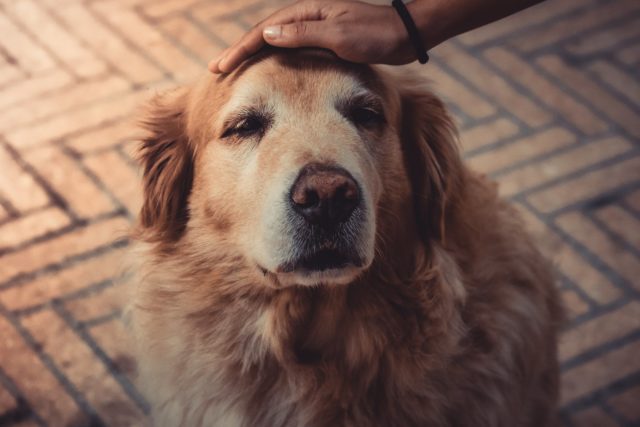Does your senior dog seem confused or restless in the evening? Maybe she paces the floor or clings to your side as night approaches? These symptoms may be signs of sundowners syndrome.
The condition was first seen in patients with dementia when caregivers noticed worsening confusion and irritability after sunset. While there is no cure, you can help your dog cope with the symptoms of sundowning.

What Is Sundowners Syndrome In Dogs?
More than 50% of dogs over the age of 10 experience symptoms of canine cognitive dysfunction (CCD). For some, the symptoms worsen in the late afternoon or early evening. This is sundowners syndrome.
While sundowners only occurs in dogs with dementia, not every pooch with CCD struggles with these stressful nighttime symptoms. Episodes also seem to be more common during the winter months when the days are shorter.
What Are The Signs & Symptoms?
- Confusion
- Restlessness
- Agitation
- Repetitive Pacing
- House Soiling
- Compulsive Licking
- Barking of Whining for No Reason
- Irritability
- Forgetfulness (waiting by their food dish when they’ve already eaten)
- Getting “Lost” in the House or Yard
- Neediness or Clingy Behavior
- Sleeping Less or Waking Throughout the Night

What Causes Sundowners Syndrome In Dogs?
Researchers are not sure what exactly causes sundowners in humans or animals. Some believe it is caused by hormone fluctuations or disruptions in the body’s biological clock. Others suspect it is connected to changing light levels and their effect on older dogs with vision impairments.
How Is The Condition Diagnosed?
Diagnosing sundowners syndrome in dogs can be quite difficult. There is no specific medical test for the condition, and many owners mistake the signs for normal aging changes.
If you notice personality or behavior issues in your aging dog – especially in the evenings – see your veterinarian. He or she will ask a series of questions to help determine if it is truly sundowners, not a medical problem.
Related: 12 Best Dog Breath Fresheners

What Can You Do To Help Your Dog?
If your vet confirms your dog is suffering from sundowners syndrome, he or she may recommend anti-anxiety medications or an MAO-inhibitor like selegiline to increase dopamine levels in the brain.
Certain natural supplements may also help ease the symptoms of sundowners. For example, try increasing the amount of antioxidants and Omega-3 fatty acids in your dog’s diet to support brain health. Healthy fruits and veggies like blueberries and spinach are rich in antioxidants while Omega-3 fatty acids are most plentiful in fish and krill oil.
Many vets also recommend melatonin for dogs, a hormonal supplement, as a natural sleep aid for sundowners syndrome in dogs. It can help your dog relax and sleep better at night.
In addition to these treatments, be sure to address any underlying medical conditions such as arthritis that may contribute to your dog’s discomfort and restlessness.

There are also several steps you can take to make things easier around the house. Try leaving a light on near your dog’s bed to reduce frightening shadows. It may also help to play soothing music or white noise to reduce distracting sounds that could disturb your pup’s sleep.
In terms of your dog’s evening schedule, be sure to stick to a reliable routine to avoid confusion. Take your dog for an evening walk or enjoy a gentle play session as a way of tiring her out and working off nervous energy.
Most importantly, be patient. Remember, your dog did not ask to develop dementia.

Sundowners syndrome is stressful and frustrating for both you and your dog. While you cannot reverse the symptoms, you can help manage them. Your senior dog is counting on you to give her the patience and understanding she needs to continue to thrive.
H/T to SeniorAdvisor.com
- Best Joint Supplement for Dogs
- Best CBD Gummies for Dogs
- Goat's Milk for Dogs
- Skin & Coat Supplements for Dogs
- Weight Gain Supplements for Dogs
- Muscle Building Supplements for Dogs
- Heart Supplements for Dogs
- Multivitamins for Dogs
- Pill Pockets for Dogs
- Digestive Enzymes for Dogs
- Turmeric for Dogs
- Liver Supplements for Dogs
- Tear Stain Supplement for Dogs
- Breath Fresheners for Dogs
- Kidney, Urinary, & Bladder Supplements for Dogs
- Stool Eating Deterrent for Dogs
- Eye Supplements for Dogs
- Melatonin for Dogs
- Apple Cider Vinegar for Dogs
- Green Lipped Mussels for Dogs
- L Theanine for Dogs
- Chondroitin Supplements for Dogs
- MSM for Dogs
- Valerian Root for Dogs
- Chamomile for Dogs
- Boswellia for Dogs
- L Tryptophan for Dogs
- Yucca for Dogs
- Licorice Root for Dogs
- Bromelain for Dogs
- Papain for Dogs
- Devil's Claw for Dogs
- Quercetin for Dogs
- Hemp gummy for dogs
- Best Hemp Dog Treats
- Best Hemp Oil for Dogs
- Best Calming Treats, Chews, & Supplements for Dogs
- Best Bone Broth for Dogs
- Best Fish Oil for Dogs
- Best Probiotics for Dogs
- Best Hip Dysplasia Supplements for Dogs
- Best Colostrum for Dogs
- Best Quercetin for Dogs
- Best Greens for Dogs Supplements
- Best Vitamin C Supplements for Dogs
- Best Probiotic for Dog with Allergies
- Best Taurine Supplements for Dogs
- Best Dog Food Toppers
- Best Anal Gland Supplement for Dogs
- Best Dog Probiotic Powder
- Best CoQ10 Supplement for Dogs
- Best Liquid Glucosamine for Dogs
- Best Wrinkle Creams, Balms, and Wipes for Dogs
- Best Puppy Calming Treats
- Best Colloidal Silver for Dogs
- Best Adaptogen Supplements for Dogs
- Best Cognitive Supplements for Dogs
- Best Bee Pollen for Dogs
- Best Vitamin A Supplements for Dogs
- Best Vitamin E Supplements for
- Best Liquid Glucosamine Supplements for Dogs
- Best SAM-e Supplements for Dogs
- Best Hyaluronic Acid Supplements for Dogs
- Best Apple Cider Vinegar Supplements for Dogs
- Best Diarrhea Medicine for Dogs
- Best Milk Thistle for Dogs
- Best Turkey Tail Mushroom Supplements for Dogs
- Best Astaxanthin Supplements for Dogs
- Best Lutein Supplements for Dogs
- Best Electrolyte Supplements for Dogs
- Best Coconut Oil for Dogs
- Best Prenatal Vitamins for Dogs
- Best Puppy Milk Replacements
- Best Iron Supplements for Dogs
- Best Dewormer Products for Dogs
- Best Mange Medications for Dogs
- Best Cough Relief Products for Dogs
- Best Sinus Relief Products for Dogs
- Best Collapsed Trachea Supplements for Dogs
- Best Fireworks Anxiety Relief Products for Dogs
- Best Thunderstorm Anxiety Relief Products for Dogs
- Best Travel Anxiety Relief Product for Dogs
- Best Supplements for a Dog with a Torn ACL
- Best Supplements for a Dog with Patellar Luxation
- Best Supplements for a Dog with Intervertebral Disc Disease
- Best Zinc Supplements for Dogs
- Best Biotin Supplements for Dogs
- Best Tart Cherry Supplements for Dogs
- Best Resveratrol Supplements for Dogs
- Best Ginkgo Biloba Supplements for Dogs
- Best Ashwagandha Supplements for Dogs
- Best Supplements for Dogs with Cushing's Disease
- Best Adrenal Supplements for Dogs
- Best NAD+ Supplements for Dogs
- Best NMN Supplements for Dogs
- Best Supplements for Dogs with Dementia
- Best Supplements for Dogs with CCD(Canine Cognitive Dysfunction)
- Best Fiber Supplements for Dogs
- Best Spirulina for Dogs
- Best Hairball Remedies for Dogs
- Best Eye Drops for Dogs with Allergies
- Best Magnesium Supplements for Dogs
- Best Brushes for Double-Coated Dogs
- Best Dandelion Root Supplements for Dogs
- Best Probiotic for Dogs with Yeast Infections
- Best Flaxseed Oil for Dogs
- Best Chamomile Supplements for Dogs
- Best Lavender Supplements. Treats & Sprays for Dogs
- Best Collagen Supplements for Dogs
- Best Kelp Supplements for Dogs
- Best Activated Charcoal for Dogs
- Best Slippery Elm Supplements for Dogs
- Best Supplements for Dogs with Seizures & Epilepsy
- Best Antioxidant Supplements for Dogs
- Best Ubiquinol Supplements for Dogs
- Best Hormone & Glandular Supplements for Dogs
- Best Thyroid Supplements for Dogs
- Best Iodine Supplements for Dogs
- Best Dog Shedding Supplements for Dogs
- Best Detox Supplements for Dogs
- Best Postbiotics for Dogs
- Best Aspirin Products for Dogs
- Best Dog Anti-Nausea Products
- Best Dog Mouthwashes
- Best Camelina Oils for Dogs
- Best Hemp Seed Oils for Dogs
- Best Natural Anti-Inflammatories for Dogs
- Best Cancer Supplements for Dogs
- Best Sardine & Anchovy Oils for Dogs
- Best Fatty Acid Supplements for Dogs
- Best Chia Seed Supplements & Treats for Dogs
- Best Olive Oils for Dogs
- Best Amino Acid Supplements for Dogs
- Best Moringa Supplements for Dogs
- Best Echinacea Supplements for Dogs
- Best Cranberry Supplements for Dogs
- Best D-Mannose Supplements for Dogs
- Best Nettle Leaf Supplements for Dogs
- Best Marshmallow Root Supplements for Dogs
- Best Astragalus Supplements for Dogs
- Best Pumpkin Seed Supplement for Dogs
- Best Supplements for a Dog Wetting The Bed
- Best Blueberry Supplement for Dogs
- Best Bromelain Supplements for Dogs
- Best Yucca Supplements for Dogs
- Best Ginger Supplements for Dogs
- Best Rosehip Supplements for Dogs
- Best Allergy Medicines for Dogs
- Best Reishi Mushroom Supplement for Dogs
- Best Maitake Mushroom Supplement for Dogs
- Best Chaga Mushroom Supplement for Dogs
- Best Shiitake Mushroom Supplement for Dogs
- Best Cordyceps Mushroom Supplement for Dogs
- Best Lion's Maine Supplement for Dogs
- Have question? - Ask in our Dog Health Forum
 Toledo, United States.
Toledo, United States.
